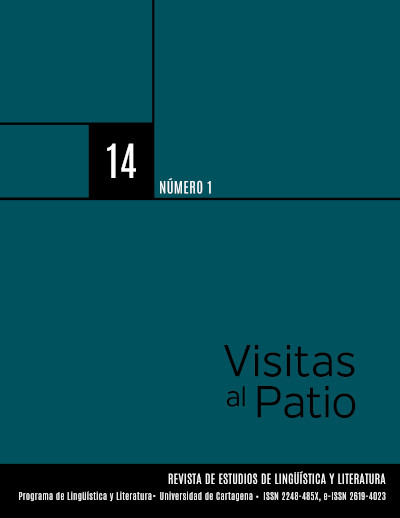Harlem : un folio del archivo (intelectual) de Manuel Zapata Olivella.
Harlem : a folio from the (intellectual) archive of Manuel Zapata Olivella.
Contenido principal del artículo
Resumen
Este estudio examina el lugar de Harlem, el pos-Harlem Renaissance, en el archivo zapataolivellano. El objetivo es contribuir con los estudios sobre el significado de este legendario espacio negro en el imaginario diaspórico afro, además de determinar la influencia del mismo sobre la narrativa de Manuel Zapata Olivella. Igualmente, este análisis apunta hacia Harlem como espacio que inspira a Zapata Olivella a adoptar decididamente una agenda de resistencia, y subraya la intención del autor de denunciar la marginalidad de Harlem, pos-Renaissance, dentro de la frágil realidad imperialista y supremacista norteamericana.
Palabras clave
Descargas
Datos de publicación
Perfil evaluadores/as N/D
Declaraciones de autoría
- Sociedad académica
- Universidad de Cartagena
- Editorial
- Universidad de Cartagena
Detalles del artículo
Referencias (VER)
Aldana, L. (2006). Entre mito e historia: hacia una estética fanoniana de la resistencia en “El árbol brujo de la libertad” de Manuel Zapata Olivella. Afro-Hispanic Review, 25(1), 39–53.
Appiah, A. (1985). The Uncompleted Argument: DuBois and the Illusion of Race. Critical Inquiry 12/1, pp. 21–37. https://doi.org/10.1086/448319 DOI: https://doi.org/10.1086/448319
A United Statesian Celebrates. (Magazine Desk)(Letter to the editor). (1986). The New York Times Magazine.
Captain-Hidalgo, Y. (1993). The Culture of Fiction in the Works of Manuel Zapata Olivella. Columbia, Missouri: Missouri UP.
DeCosta-Willis, M. (1973). Nicolás Guillén and His Poetry for Afro Americans. Black World 22/ (11), 12-16.
Ferguson, J. B. (2008). The Harlem Renaissance: A Brief History with Documents. Boston: Bedford/San Martin.
Flóres Bolívar, F. J. (2015). Un diálogo diaspórico: el lugar del Harlem Renaissance en el pensamiento racial e intelectual afrocolombiano (1920-1948). Historia crítica, (55), 101-124. https://doi.org/10.7440/histcrit55.2015.05 DOI: https://doi.org/10.7440/histcrit55.2015.05
Hughes, L. (2002). Autobiography: The Big Sea. In: The Collected Works of Langston Hughes, Vol. 13. Joseph McLaren ed. Columbia, Missouri : Univ. of Missouri Press.
Hughes, L. “Harlem.” Poetry Foundation Recuperado de https://www.poetryfoundation.org/poems/46548/harlem
Hughes, L. (1958). The Langston Hughes Reader. New York: G. Braziller.
Jackson, R. (1981). The Shared Vision of Langston Hughes and Black Hispanic Writers. Black American Literature Forum, 15(3), 89–92. https://doi.org/10.2307/2904254 DOI: https://doi.org/10.2307/2904254
Johnson, J. W. (1968). Black Manhattan. New York: Arno Press.
Leino, L. El legado que deja…Langston Hughes: Risas y lágrimas del negro. Manuel Zapata Olivella Collections, Jean and Alexander Heard Library, Vanderbilt University, Box 45.
Lomas, L. (2009). José Martí's “Evening of Emerson” and the United Statesian Literary Tradition. Journal of American Studies, 43(1), 1–17. https://doi.org/10.1017/S0021875809006021 DOI: https://doi.org/10.1017/S0021875809006021
Mullen, E. (1977). Langston Hughes in the Hispanic World and Haiti. North Haven: Shoe String Press Inc..
Nascimento, A. (1979). Genocide: The Social Lynching of Africans and Their Descendants in Brazil. En: Brazil Mixture of Massacre (pp. 57-94). Dover, MA: The Majority Press.
Osofsky, G. (1966). Harlem, the Making of a Ghetto: Negro New York, 1890-1930. Harper & Row.
Palacios, G. Manuel Zapata Olivella (1920-2004): pensador político, radical y hereje de la diáspora africana en las Américas (2020). Medellín: Pontificia Universidad Bolivariana.
Prescott, L. (2012). Liberating Blackness: The Theme of Whitening in Two Colombian Short Stories. Callaloo, 35(2), 475–493, 565. https://doi.org/10.1353/cal.2012.0074 DOI: https://doi.org/10.1353/cal.2012.0074
Prescott, L. (2007). Journeying Through Jim Crow: Spanish American Travelers in the United States During the Age of Segregation. Latin American Research Review, 42(1), 3–28. https://doi.org/10.1353/lar.2007.0010 DOI: https://doi.org/10.1353/lar.2007.0010
Prescott, L. (2006). Brother to Brother: The Friendship and Literary Correspondence of Manuel Zapata Olivella and Langston Hughes1. Afro-Hispanic Review, 25(1), 87–103, 252.
Proceedings of the Primer Congreso de la Cultura Negra de las Américas, UNESCO, 1988.
Ratcliff, A. (2008) “Black Writers of the World, Unite!”; Negotiating Pan-African Politics of Cultural Struggle in Afro-Latin America. The Black Scholar, 37(4), 27-38. https://doi.org/10.1080/00064246.2008.11413419 DOI: https://doi.org/10.1080/00064246.2008.11413419
Saffire, W. (1986). On Language; Who Is an “American”? (Magazine Desk). The New York Times Magazine.
Temple, C. N. (2005). Literary Pan-Africanism: History, Contexts, and Criticism. Durham: Carolina Academic Press.
Valero, S. (2020). “Los negros se toman la palabra.” Primer Congreso de la Cultura Negra de las Américas: Debates al interior de las comisiones y plenarias. Bogotá-Cartagena: Universidad Javeriana, Universidad de Cartagena, CEA.
Valero, S. y Campos García A. (Eds.) (2015). Identidades Políticas En Tiempos de Afrodescendencia: Auto-Identificación, Ancestralidad, Visibilidad y Derechos, Buenos Aires: Ediciones Corregidor.
Zapata Olivella, M. (2010). Harlem olvidado. Sábado [25 de diciembre, 1948]: 6-14. En: Manuel Zapata Olivella, por los senderos de sus ancestros: Textos escogidos 1940-2000. Vol. XVIII. Múnera A. (Ed.) (pp. 96-103). Bogotá: Biblioteca de Literatura Afrocolombiana.
Zapata Olivella, M. (1969). He visto la noche: las raíces de la furia negra. Medellín: Editorial Bedout.
Zapata Olivella, M. (1955). Hotel de vagabundos. Colombia: Ediciones Espiral.
Zapata Olivella, M. (6 de septiembre de1947). Miserias de New York. Sábado, 13, 15.
Zapata Olivella, M. Negritud y liberación. Manuel Zapata Olivella Collections, Jean and Alexander Heard Library, Vanderbilt University, Box47, Vol. III, pp.768-784.
Zapata Olivella, M. Langston Hugues o el valor de la poesía. Manuel Zapata Olivella Collections, Jean and Alexander Heard Library, Vanderbilt University, Box 47, Vol II, 458-469.
Zapata Olivella, M. (2000). Pasión vagabunda. Colombia: Ministerio de Cultura.



 PDF
PDF
 FLIP
FLIP





